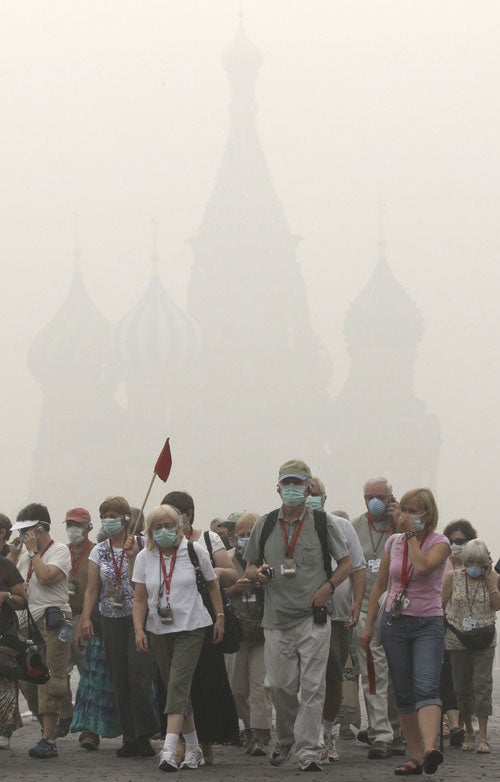Pollution reaches new high as smog smothers Moscow
Residents don face masks while authorities fight to keep forest fires away from nuclear installation

A suffocating smog from wildfires hung over the Russian capital on Saturday, raising the concentration of dangerous pollutants to a new high as residents donned masks and dozens of flights were delayed at the city's airports.
In the Niznhy Novgorod region, 220 miles east of Moscow, Russian troops had to dig a five-mile canal to keep the fires away from the Sarov nuclear arms facility, which is ringed by forest. This was where the first Soviet atomic bomb was produced in 1949 and it remains the country's main nuclear design and production facility. Last Thursday, Russia's nuclear chief assured President Dmitry Medvedev that all explosive and radioactive material had been removed as a precautionary measure.
Nearly 600 separate blazes were burning nationwide yesterday, mainly across western Russia, according to the Emergencies Ministry, which said that the area affected had increased over the past 24 hours. Hundreds of forest and peat bog fires have ignited amid the country's most intense heat wave in 130 years. At least 52 people have been killed directly by the fires, and more than 4,000 made homeless. Some officials said that an estimated 5,000 people are thought to have died as a result of the resulting air pollution.
Moscow and most of western Russia have had temperatures approaching 38C, and it is expected to remain hot for at least a week. The area's average summer temperature is 23C.
A thick haze engulfed Moscow for a second day as south-eastern winds blew smoke from the areas worst affected by the forest fires. Meteorologists said the winds are unlikely to change over the next few days. The concentration of carbon monoxide is at more than six times normal levels, according to city health officials. The smog has seeped into buildings and the city's subway system. "The smoke is everywhere – at home, in shopping malls, on the subway," said Roman Morozov, 29, an architect.
Visibility was down to a few hundred metres, and dozens of flights bound for Moscow's Domodedovo and Vnukovo airports were diverted to other airports or delayed. Health officials have urged those who have to go outdoors to wear face masks and say people staying inside should hang wet towels to attract dust and cool the airflow. The health ministry said hundreds of people have needed medical attention because of the smog.
Russian officials have acknowledged that the 10,000 firefighters battling the blazes aren't enough – an assessment echoed by many people, who said the fires swept through their villages in minutes. Several countries sent firefighting aircraft to help battle the blazes. Russian television yesterday showed two Italian firefighting amphibious planes arriving in the Samara region on the Volga River to help save a natural preserve engulfed by fires.
Gennady Onishchenko, the chief sanitary official, yesterday sought to reassure foreign visitors. "An overwhelming part of Russian territory does not pose any danger and is not engulfed in smoke," he said.
Mr Medvedev has donated £7,500 of his own money to help the victims of the fires, and other top federal officials were expected to follow suit, the Kremlin said yesterday.
Join our commenting forum
Join thought-provoking conversations, follow other Independent readers and see their replies
Comments
Bookmark popover
Removed from bookmarks